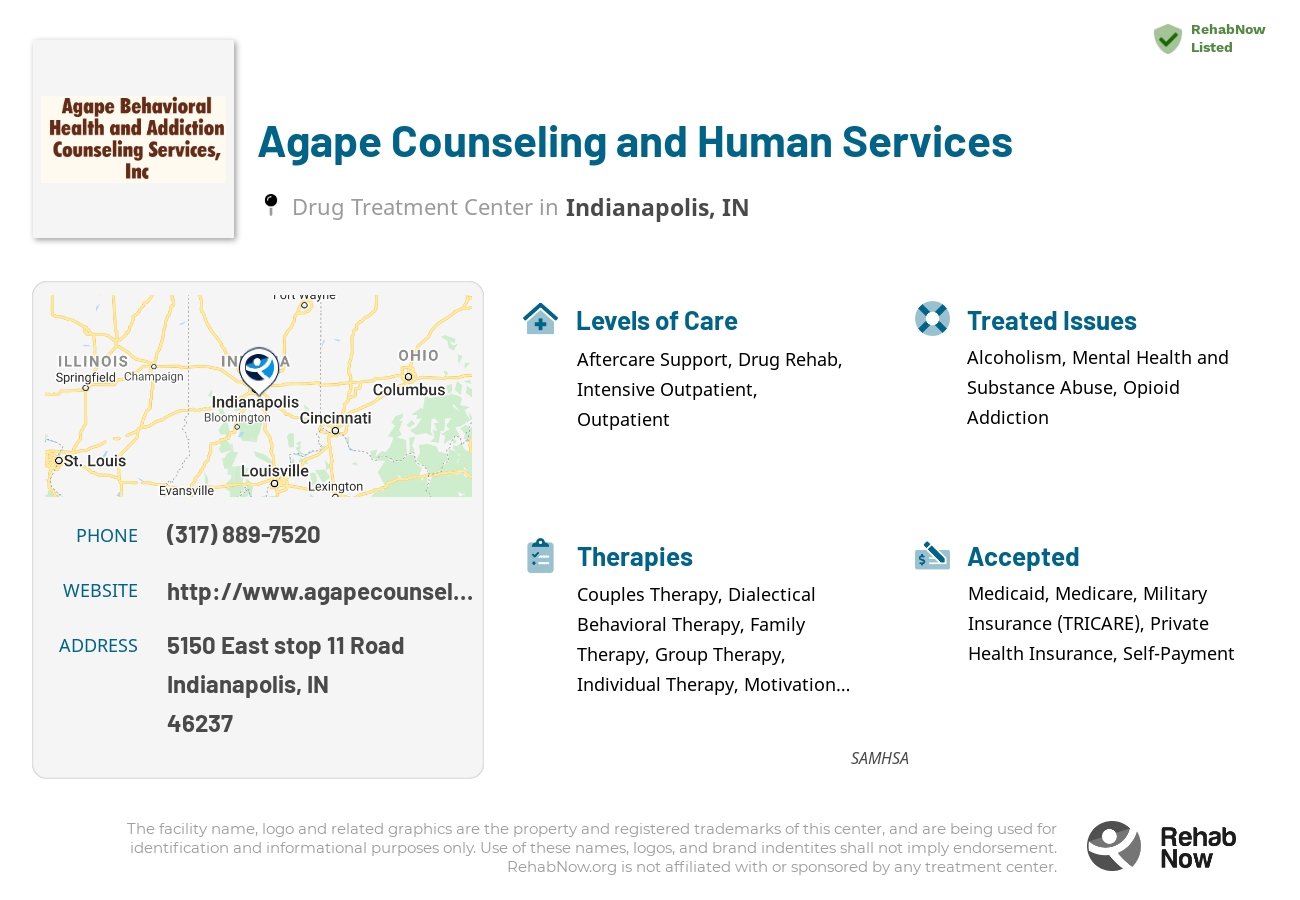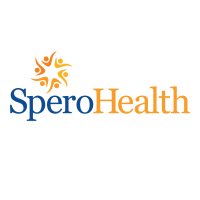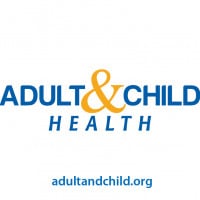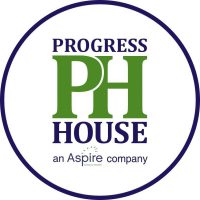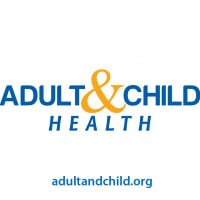Agape Counseling and Human Services
Drug Rehab Center in Indianapolis, Indiana
Agape Counseling and Human Services in Indianapolis, Indiana, is a private, not-for-profit counseling agency that offers a wide range of therapies for mental health, addiction and substance abuse, and general wellness, including outpatient and residential services, intensive substance abuse treatment, and gender-specific programs.
About Agape Counseling and Human Services in Indiana
Agape Counseling and Human Services, based in Indianapolis, Indiana, is dedicated to the comprehensive treatment of alcoholism, drug addiction, and co-occurring mental health issues. This private rehabilitation center stands out for its holistic approach to recovery, focusing on unlocking clients' potential for a fulfilling life beyond addiction.
Accredited by the Commission on Accreditation of Rehabilitation Facilities (CARF), and holding certifications from SAMHSA and a State License, Agape Counseling and Human Services is committed to providing high-quality, evidence-based treatment. Their licensed professionals are adept at handling a broad spectrum of addictions and mental health challenges, employing a variety of therapeutic modalities to support recovery.
- Holistic Treatment Approach: Agape focuses on treating the entire person, not just the addiction, with a broad range of therapies.
- Evidence-Based Programs: This facility is known for its gender-specific, evidence-based treatment programs and dual-diagnosis treatment.
- Accredited and Experienced Staff: With CARF accreditation and a team of licensed professionals, Agape offers a high standard of care.
Agape Counseling and Human Services specializes in treating individuals struggling with alcoholism, drug addiction, including opioid addiction, and mental health issues. Their methodology includes intensive inpatient and outpatient programs, individual and group counseling, 12-step programs, and customized relapse prevention plans, providing a robust foundation for long-term sobriety and mental health stability.
Genders
Ages
Modality
Additional
Accreditations
State License
SAMHSA
Conditions and Issues Treated
Opioid addiction has become a significant health problem in the United States. In 2015, there were 91 opioid overdose-related deaths per day, with a substantial increase in mortality rate in 2014.
When opioid addiction has reached a point where a person’s life becomes unmanageable, treatment options are available to help them get sober. Treatment that includes medical care with medications and counseling can help a user transition into sobriety.
Levels of Care Offered
This center offers a variety of custom treatment tailored to individual recovery. Currently available are Aftercare Support, Drug Rehab, Intensive Outpatient, Outpatient, with additional therapies available as listed below.
The Intensive Outpatient Program offered by Agape Counseling and Human Services is designed for those who need intensive care but would rather get it in the comfort of their own home. The treatment programs vary in duration and intensity and can be tailored to suit the patient’s needs. The program includes regular visits to the facility, though the overnight stay is not needed. IOP is suitable for patients who have been treated in residential treatment programs and are in the transition phase. It helps the patient live at home and discharge some work or school responsibilities even while undergoing treatment. The patients gradually get back to their routine life with the support of a friend or family member.
Outpatient treatment is often used for drug addicts in drug rehab. Outpatient treatment consists of counseling and therapy sessions. This form of treatment is also called ‘day-treatment’. The outpatient treatment process begins with the addict’s initial detox period, lasting about ten days.
Outpatient treatment is used for those who are at moderate risk for ‘slipping back’ into the addiction, for those who:
- Are not currently experiencing any side effects from withdrawal and can handle social pressure
- Can handle stressors that might trigger relapse
- Have a stable living environment or have moved out of their previous environment, which was not conducive to being sober
- Have a support system that allows them to go to a facility a few times a week while still keeping their current responsibilities
- Have no legal obligations, being either on parole or probation, that require them to seek treatment at a mandatory facility
- Are not currently experiencing any side effects from withdrawal and can handle social pressure
- Have a stable living environment or have moved out of their previous environment, which was not conducive to being sober
Completing a drug or alcohol rehab program is only the first step. Then comes aftercare support. These services include sober living accommodations, career counseling, and AA/NA programs for those struggling with sobriety or who want help maintaining it after initial rehab at an addiction facility.
They can last up to a year or more depending on what’s needed most urgently after the earlier stages are completed.
Therapies & Programs
Because no single treatment is effective for all addicts, the goal of treatment and therapy should be to figure out what works best for each individual. Tolerance and withdrawal levels differ from person to person, affecting the treatment intensity required. Addiction treatment should aim to help addicts develop healthy coping mechanisms for dealing with their addiction and its underlying causes.
Couples therapy works with clients and significant others in a professional capacity to improve relationship dynamics. This can be helpful for addicts who are trying to marry the idea of recovery into their work, family, social lives – any aspect that has to do with relationships. Through counseling sessions, addicts will have an opportunity to talk about their addiction with professional partners.
Family therapy is beneficial for people who are in addiction treatment services because it offers addicts the opportunity to work with their family members to better understand what led them to make choices that contributed to their addiction.
This type of therapy helps family members reach a deeper understanding of how they can best support their loved one during recovery. It also helps the addict better understand their own motivations and triggers that led them to turn to substance abuse.
Family therapy can help addicts in the following ways:
- Assists family members in processing difficult feelings so they don’t blame or resent recovering addicts
- Assists family members in understanding how addiction has impacted the addict and everyone who is involved with them
- Allows the addict to take responsibility for their actions, while encouraging improved communication skills
- Helps family members understand how to best support an individual in recovery so addicts don’t relapse again.
Group therapy can help build a stronger support system and give addicts in Indianapolis, IN insight into their addiction that they gain through shared conversations. Group therapy occurs in a controlled group environment, exclusive of one on one meetings. This makes it safer for patients to feel comfortable sharing the struggles they’re going through and gaining perspective.
Trauma therapy is beneficial for people who are recovering from drug addiction because it helps them heal from past traumas that may have caused them to turn to harmful substances or led them to experience negative emotions that contributed to their destructive behaviors.
This type of treatment works by processing difficult experiences so individuals can learn how to process these events without having to turn to substances for coping.
Trauma therapy can help addicts in the following ways:
- Helps individuals understand their experiences and emotional responses to difficult events, including why they turned to drugs or alcohol
- Provides them with comfort and support while working through difficult emotions related to these traumatic experiences
- Offers an opportunity for addicts to have a voice and be heard, which can improve their self-esteem
- Can help them develop coping skills so they can better respond to triggers instead of turning to substance abuse.
Dialectical Behavior Therapy (DBT) is a cognitive-behavioral therapy that helps patients understand the relationship between their thoughts, feelings, and behaviors. It is beneficial for those whose addictions and behaviors stem from severe mental health issues. The term “Dialectic” means the integration of opposites. In substance abuse, DBT refers to accepting the patient’s addiction and working to change their thoughts and behavior. It improves life skills such as controlling intense emotions without reacting impulsively, resolving interpersonal conflicts effectively, and promoting awareness about self and others.
Cognitive-behavioral therapy is a technique that is used to help people with addiction. Specifically, it is a way of identifying thoughts and behaviors that cause the addiction. It is typically used in an individual counseling session.
The content explains cognitive behavioral therapy and how it works to address some behaviors that may be leading to unintended consequences in their life, as well as its benefits for those seeking sobriety.
It works by helping people to talk through their issues and addressing the thoughts that cause said behaviors. It is an excellent way of learning about oneself and one’s perception of the world.
Addicts seeking sobriety can find quick results with Rational Emotional Behavior Therapy. This type of counseling offered by Agape Counseling and Human Services replaces negative and self-limiting thoughts with positive and productive behaviors. This allows addicts to move forward without having to deal with ongoing treatment throughout their lives. Individuals who are seeking sobriety can find quick results with Rational Emotional Behavior Therapy.
Payment Options Accepted
For specific insurance or payment methods please contact us.
Is your insurance accepted?
Ask an expert, call (888) 674-0062
Additional Details
Specifics, location, and helpful extra information.
Indianapolis, Indiana 46237 Phone Number(317) 889-7520 Meta DetailsUpdated April 15, 2024
Staff Verified
Agape Counseling and Human Services Patient Reviews
There are no reviews yet. Be the first one to write one.
Indianapolis, Indiana Addiction Information
The state of Indiana ranks 14th in the nation for drug abuse, but 17th for drug overdoses. The state has many high-quality rehabilitation centers, but reports show that there are about 20 deaths per 100,000 people. This is due to its location making it a drug trafficking haven, where many drugs are further distributed into the country.
The drug addiction problem in Indianapolis, Indiana, is quite severe. There were over 1,600 overdose deaths in Indianapolis between 1999 and 2016. This means that, on average, there were about 100 overdose deaths per year in Indianapolis during that period. Rehab centers in Indianapolis, Indiana, offer a variety of programs, including inpatient and outpatient programs, 12-step programs, and faith-based programs.
Treatment in Nearby Cities
- Martinsville, IN (24.2 mi.)
- New Castle, IN (42.3 mi.)
- Portland, IN (79.6 mi.)
- Valparaiso, IN (136.1 mi.)
- Elwood, IN (45.1 mi.)
Centers near Agape Counseling and Human Services
The facility name, logo and brand are the property and registered trademarks of Agape Counseling and Human Services, and are being used for identification and informational purposes only. Use of these names, logos and brands shall not imply endorsement. RehabNow.org is not affiliated with or sponsored by Agape Counseling and Human Services.




